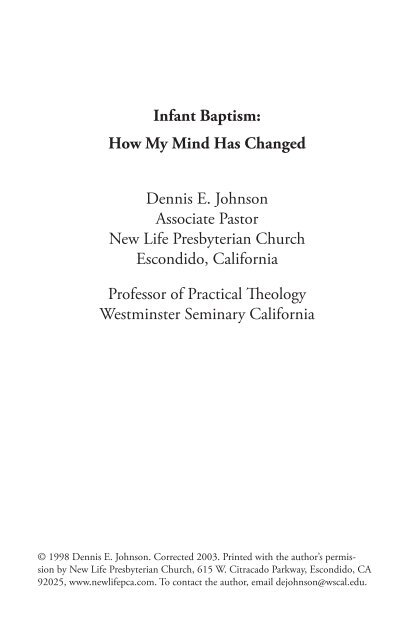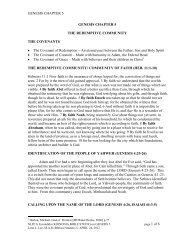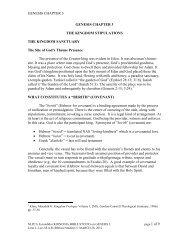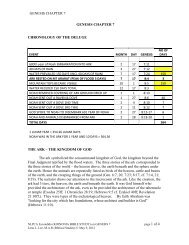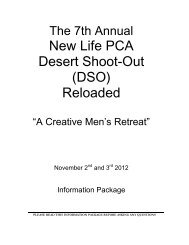Infant Baptism - (PCA) > Welcome from Pastor Ted Hamilton
Infant Baptism - (PCA) > Welcome from Pastor Ted Hamilton
Infant Baptism - (PCA) > Welcome from Pastor Ted Hamilton
Create successful ePaper yourself
Turn your PDF publications into a flip-book with our unique Google optimized e-Paper software.
<strong>Infant</strong> <strong>Baptism</strong>:<br />
How My Mind Has Changed<br />
Dennis E. Johnson<br />
Associate <strong>Pastor</strong><br />
New Life Presbyterian Church<br />
Escondido, California<br />
Professor of Practical Theology<br />
Westminster Seminary California<br />
© 1998 Dennis E. Johnson. Corrected 2003. Printed with the author’s permission<br />
by New Life Presbyterian Church, 615 W. Citracado Parkway, Escondido, CA<br />
92025, www.newlifepca.com. To contact the author, email dejohnson@wscal.edu.
In 1994 one of our daughters, while away <strong>from</strong> home attending<br />
college, asked me to explain the rationale I saw in God’s Word for<br />
baptizing the infant children of believers. Since I was a minister<br />
in the Orthodox Presbyterian Church when she and her siblings<br />
were born, they had all been baptized as infants; but now she was<br />
interacting with Christian brothers and sisters <strong>from</strong> other traditions<br />
through campus Christian ministry and other friendships,<br />
and many of them believed that the baptism of infants is not<br />
Christian baptism as it is established by Christ in the New Testament.<br />
In a slightly revised form, this is what I wrote to her:<br />
Here at last is my long-overdue letter to explain why I believe it’s<br />
consistent with the Bible to baptize the infants and children of believers.<br />
I want to let you know what biblical evidence changed my mind<br />
<strong>from</strong> holding a “believers’ baptism” position to the conviction that<br />
both those who are converted as adults and the infants and children of<br />
believers should be baptized.<br />
You know, of course, that I don’t consider this issue one on which our<br />
trust-relationship with Jesus depends. Nor should differences on this<br />
issue disrupt our fellowship with brothers and sisters in Christ who<br />
see things differently. On the other hand, since we all want to show<br />
our gratitude for God’s grace by living our lives to please him, and<br />
since we learn what pleases him in his Word, we all want to get as<br />
clear a picture as we can of what the Word teaches.<br />
The difference of views on infant baptism unfortunately does affect<br />
Christians’ ability to demonstrate in practice our unity as the Body of<br />
Christ. “<strong>Infant</strong> baptizers” can and do recognize the baptism received<br />
by “believer baptizers” as genuine Christian baptism (although we<br />
may think that it’s administered later than it should be in the case<br />
of children of Christian parents). But “believer baptizers” cannot<br />
acknowledge that believers who were baptized as infants have been<br />
baptized at all. So if “believer baptizers” are right—if people who<br />
have received infant baptism have not received biblical baptism at<br />
all—then there have been hundreds of thousands, perhaps millions,<br />
of Christian believers who have never obeyed the Lord’s command to<br />
be baptized in his Name, believers such as Augustine, Luther, Calvin,<br />
Zwingli, J. Gresham Machen, J. I. Packer, John Stott, R. C. Sproul,<br />
Printed 1/11 Page 3
<strong>Infant</strong> <strong>Baptism</strong>: How My Mind Has Changed<br />
etc. On the other hand, if “infant baptizers” are right, then it’s sad<br />
that the convictions of “believer baptizers” prevent them <strong>from</strong> recognizing<br />
the baptism of so many other members of the Body of Christ.<br />
So our difference of understanding on this issue does hinder our<br />
putting into practice the unity of the church. Although this question<br />
is not a matter of salvation, it is certainly worth our investing time<br />
and thought and study, to see whether we can come to unity as brothers<br />
and sisters in Christ.<br />
I Changed My Mind<br />
First a little autobiography (I may have told you this before): It was<br />
a major change of mind for me to come to accept infant baptism. I<br />
was baptized as an infant in First Covenant Church of Los Angeles,<br />
but by the time I was an early adolescent we had a different pastor (in<br />
the same congregation!), and our new pastor didn’t believe that infant<br />
baptism was valid. My parents had not really studied this question<br />
or taught me whether there was a biblical basis for infant baptism,<br />
so I had no reason to question what my pastor said when he taught<br />
that my baptism as an infant wasn’t genuine Christian baptism.<br />
Therefore, after a time of instruction in Bible doctrine (in effect, a<br />
catechism class), I publicly confessed my faith in Christ and “joined<br />
the church,” being baptized by immersion on the basis of my personal<br />
profession of faith. 1 (This means that, whichever view of baptism is<br />
right, I personally am covered!) I went through high school and Westmont<br />
College assuming that only people old enough to believe and<br />
testify to their faith should be baptized.<br />
This was my view even as I started my seminary studies at West-<br />
1 My pastor also believed that immersion (Romans 6:4) is the only right<br />
mode by which to apply the water of baptism. He would not recognize sprinkling<br />
(Hebrews 9:13-14; 1 Peter 1:2; Ezekiel 36:25) or pouring (Acts 1:5; 2:17-18, 33:<br />
“You will be baptized with Spirit” = “I will pour out my Spirit”; see Titus 3:5-6),<br />
even though these methods of applying cleansing liquid (water/blood) are used repeatedly<br />
in Scripture, and sometimes tied directly to the language of baptism (as in<br />
Acts 1-2). The verses above suggest that baptism symbolizes not only death, burial,<br />
and resurrection with Christ, but also cleansing <strong>from</strong> sin’s uncleanness (sprinkling)<br />
and the gift of the Spirit (pouring). Therefore it seems that any of these modes is<br />
appropriate, since each mode points to some aspect of the spiritual reality of which<br />
baptism is a sign.<br />
Page 4 Printed 1/11<br />
<strong>Infant</strong> <strong>Baptism</strong>: How My Mind Has Changed<br />
minster, although I was puzzled that my seminary professors, who<br />
understood the Bible so much better than I in so many areas, seemed<br />
to have missed the obvious point that in the New Testament people are<br />
called to believe, and then they are baptized. I suppose I concluded<br />
that they believed in infant baptism because that was what they were<br />
accustomed to. (That explanation, however, didn’t fit everyone: Dr.<br />
Strimple had remained a Baptist throughout college and his studies<br />
at Westminster, and had taught at a Baptist Bible college in Canada<br />
for many years before he became convinced that infant baptism is<br />
biblical.) “I’m accustomed to this” is not a good reason for believing<br />
or doing something as a Christian, but sometimes what we’re used to<br />
does influence our faith and our conduct. In any case, at Westminster<br />
I had to face the possibility that I was the one operating on the basis<br />
of what I was accustomed to, dismissing infant baptism because of assumptions<br />
I had picked up as a teenager and had reinforced through<br />
college. In particular Westminster forced me to examine my assumptions<br />
about how to search the Bible for the answer to a theological<br />
question like this. 2<br />
How Should We Expect the Bible to Answer the <strong>Infant</strong> <strong>Baptism</strong><br />
Question?<br />
I had to face the question, how should I expect the Bible to answer<br />
my question, “Should the babies of Christians be baptized?” I was<br />
expecting the Bible to answer the question with an explicit statement<br />
in one or more verses. I read verses like Acts 2:38 (“Repent and be<br />
baptized . . . in the name of Jesus Christ for the forgiveness of your<br />
2 Over Labor Day weekend I was preaching in Portland, OR, and spent the<br />
afternoon with a couple in the church there. We were talking about infant baptism<br />
and I learned that the husband had come to faith in a Baptist church and had then<br />
come to believe that infant baptism is biblical while he was studying at Western<br />
Conservative Baptist Seminary. I asked him what had changed his mind, and he<br />
mentioned especially coming to see that circumcision in the Old Testament was<br />
a sign of “the righteousness of faith” (Romans 4:11), and yet Abraham was commanded<br />
to circumcise infants who were too young to demonstrate faith. If that was<br />
so in the Old Testament, he concluded, it could also be true of baptism in the New.<br />
I’ll pick up this idea below, but I thought you would be interested to learn of this<br />
brother’s experience of coming to believe in the appropriateness of infant baptism<br />
not in an “infant baptist” seminary like Westminster but in a “believer baptist”<br />
seminary like Western.<br />
Printed 1/11 Page 5
<strong>Infant</strong> <strong>Baptism</strong>: How My Mind Has Changed<br />
sins. And you will receive the gift of the Holy Spirit.”) or Acts 16:31-<br />
34 (“Believe in the Lord Jesus, and you will be saved—you and your<br />
household . . . . Immediately he and all his family were baptized . .<br />
. he had come to believe in God—he and his whole family.”). The<br />
order of things seemed so clear: first repentance/belief, then baptism.<br />
What could be plainer and simpler?<br />
Everybody Agrees that Adult Converts <strong>from</strong> Judaism and Paganism<br />
Must Be Baptized.<br />
But then someone pointed out something to me: Throughout the<br />
Book of Acts we read about the conversion of people who were not<br />
Christians, nor had they grown up as the children of (New Covenant)<br />
Christians, before the Apostles preached to them—either Jews or<br />
Gentiles. The preaching and examples of conversions in Acts all have<br />
to do with missionary situations, in which the Gospel is entering the<br />
lives of individuals and families and communities for the first time.<br />
Everyone, “believer baptist” and “infant baptist” alike, agrees that in<br />
circumstances like these, when people have not grown up in Christian<br />
families and the “covenant community” of the Church, those converted<br />
as adults need to receive baptism when they confess their faith in<br />
Jesus.<br />
But Acts Is Silent About Children Born to Christian Parents.<br />
Acts never explicitly describes a situation that would make crystal clear<br />
how the apostles handled the situation of children born to Christian<br />
parents. (Obviously, if Acts had spoken directly and clearly on this<br />
point, the discussion between “believer baptist” and “infant baptist”<br />
would have been settled long ago.) In particular:<br />
(1) Acts never tells us about an adolescent or young adult who had<br />
been raised <strong>from</strong> infancy by parents who believed in Jesus, and who<br />
then received baptism only after he or she personally expressed his/her<br />
faith in Christ. 3<br />
3 Timothy is the only individual whose “childhood history” we know much<br />
about, but it’s likely that both he and his mother were, so to speak, “Old Testament<br />
believers” until Paul arrived in Lystra, bringing the news that God’s Old Testament<br />
promises had been fulfilled in Jesus the Messiah (Acts 16:13; 2 Tim. 1:5; 3:10,<br />
15). Since Timothy’s mother taught him the Scriptures “<strong>from</strong> infancy,” apparently<br />
Page 6 Printed 1/11<br />
<strong>Infant</strong> <strong>Baptism</strong>: How My Mind Has Changed<br />
(2) Although Acts records the baptism of whole households, it never<br />
explicitly states whether or not there were infants or young children<br />
in any of these homes, or whether infants in the household were excluded<br />
<strong>from</strong> receiving baptism because they were too young to express<br />
personal faith in Christ.<br />
(3) Acts and the rest of the New Testament never record any statement<br />
by Jesus or the Apostles that the infants of believers are now to be<br />
treated differently in the New Covenant <strong>from</strong> the way that the infants<br />
of Israelite believers were in the Old: namely, that, whereas Israelite<br />
children were treated as part of the covenant community, the children<br />
of Christians are to be treated as outside the covenant community that<br />
is under Christ’s Lordship. The other changes that occurred with the<br />
coming of Christ are clearly indicated in the New Testament: Circumcision<br />
is not to be required of Gentiles (Galatians), but both Jews and<br />
Gentiles who come to faith must be baptized (Acts). Animal sacrifices<br />
are done away with because of Jesus’ final sacrifice (Hebrews 10).<br />
The kosher dietary laws no longer apply because Jesus cleanses people<br />
<strong>from</strong> all nationalities (Mark 7; Acts 10-11). The temple in Jerusalem is<br />
replaced by a “living temple” made up of people (1 Peter 2). But the<br />
New Testament never hints that the relationship of believers’ children<br />
to the church community has changed: The New Testament never<br />
suggests that, although before Jesus’ coming Israelite children were<br />
“inside” the covenant community and received the covenant sign of<br />
circumcision (the boys, that is), now since Jesus’ coming the children<br />
of believers are “outside” the community and therefore excluded <strong>from</strong><br />
the covenant sign of baptism.<br />
We’ll come back to this topic of the way the New Testament views the<br />
children of believers, but for now I simply wanted to show you how<br />
I came to recognize that there is no New Testament text that answers<br />
pointblank the question, “Should believers have their children baptized?”<br />
she would have had him circumcised as an infant as the Law commanded, were it<br />
not for the fact that his Gentile father forbade it. Paul circumcised him as a young<br />
adult not because circumcision is a sacrament/sign still applied to believers under<br />
the New Covenant, but simply to remove a potential obstacle to the effectiveness of<br />
Timothy’s ministry among Jews. Anyway, we don’t ever read about when Timothy<br />
was baptized.<br />
Printed 1/11 Page 7
<strong>Infant</strong> <strong>Baptism</strong>: How My Mind Has Changed<br />
Starting <strong>from</strong> Broader Themes Where the Bible Speaks Clearly<br />
So then, where do we go <strong>from</strong> here? We approach this question, like<br />
other, even more important questions (the Trinity, the mystery of<br />
the Person of Jesus as both fully God and fully man): We approach<br />
it <strong>from</strong> the perspective of broader, bigger questions that the Bible does<br />
answer clearly for us. Then, since God’s Word is consistent <strong>from</strong> beginning<br />
to end, we carefully draw conclusions <strong>from</strong> what we know the<br />
Bible teaches.<br />
This is more complicated than simply pointing to a verse or two, but<br />
it’s also safer than drawing our own conclusions <strong>from</strong> what a particular<br />
verse says or does not say. Suppose every Christian concluded that<br />
Jesus’ words in Mark 10:21 are addressed literally to us all: “Go, sell<br />
everything you have and give to the poor. . . . Then come, follow me.”<br />
We all need to beware of being “owned” by our possessions, but if we<br />
all sold everything, could we also obey 1 Tim. 5:8 (“If anyone does<br />
not provide for his relatives, and especially for his immediate family,<br />
he has denied the faith and is worse than an unbeliever”)? Would<br />
there be anyone in the church for Timothy to instruct to use their<br />
wealth in doing good (1 Tim. 6:17-19 )? We recognize that we have<br />
to understand Mark 10:21 in the context of Jesus’ conversation with<br />
the rich young man, and in the context of the teaching of other passages<br />
of the Bible. We need to do the same with infant baptism.<br />
Circumcision Was Administered to <strong>Infant</strong> Israelite Boys.<br />
One clear place to start is with the fact that circumcision was administered<br />
to infant Israelite boys at the age of 8 days (Gen. 17:9-14).<br />
This sign of God’s covenant was given to Abraham long before the<br />
Law was given to Moses in Mt. Sinai. Apparently all of those circumcised<br />
that day in response to God’s command were older than<br />
infancy: Abraham was 99 and Ishmael was 13; other males (including<br />
servants) were no doubt of various ages (Gen. 17:23-27). But their<br />
age, and thus their mental/spiritual ability to respond to God’s promise<br />
in faith, was irrelevant. All were circumcised because Abraham<br />
believed God.<br />
Circumcision Was a Sign of Salvation Blessings that Are Received<br />
Page 8 Printed 1/11<br />
by Faith.<br />
<strong>Infant</strong> <strong>Baptism</strong>: How My Mind Has Changed<br />
God calls circumcision a “sign” of his covenant, so we can ask what<br />
circumcision “signified,” what it “pointed to” in terms of the relationship<br />
of Abraham and his family to the Lord.<br />
A Sign of Transformation of Heart (New Birth by the Spirit). Later in<br />
the Old Testament God makes it clear that external circumcision of<br />
the flesh was a sign or symbol of a spiritual cleansing that God calls<br />
“circumcision” of the heart: “Circumcise your hearts, therefore, and<br />
do not be stiff-necked any longer” (Deut. 10:16). Moses prophesies<br />
that the Israelites will disobey God and receive the judgments they<br />
deserved (especially the Babylonian Exile). But after this God will<br />
regather them to the land (return under Ezra and Nehemiah), and<br />
“The Lord your God will circumcise your hearts and the hearts of<br />
your descendants, so that you may love him with all your heart and<br />
with all your soul, and live” (Deut. 30:6). I believe God is referring<br />
to this promise when he says through Ezekiel: “I will gather you <strong>from</strong><br />
all the countries. . . . I will sprinkle clean water on you, and you will<br />
be clean. . . . I will give you a new heart and put a new spirit in you; I<br />
will remove the heart of stone and give you a heart of flesh. And I will<br />
put my Spirit in you and move you to follow my decrees. . . .” (Ezek.<br />
36:24-27).<br />
But Outward Circumcision Did Not Guarantee Circumcision of Heart.<br />
Now, receiving external circumcision did not guarantee that an Israelite<br />
boy had received spiritual circumcision, or would later receive<br />
spiritual circumcision. “’The days are coming, declares the Lord,<br />
‘when I will punish all who are circumcised only in the flesh—Egypt,<br />
Judah, Edom, Ammon, Moab—and all who live in the desert in<br />
distant places. For all these nations are really uncircumcised, and even<br />
the whole house of Israel is uncircumcised in heart” (Jer. 9:25-26). How<br />
shocking for an Israelite to hear these words, to be grouped among<br />
the uncircumcised, unclean Gentiles! But only if they never understood<br />
that circumcision was a sign pointing to their hearts’ need for<br />
cleansing by the gracious Spirit of God!<br />
A Sign of the Righteousness We Receive by Faith. In the light of God’s<br />
teaching in the Old Testament we can understand Paul’s comments<br />
Printed 1/11 Page 9
<strong>Infant</strong> <strong>Baptism</strong>: How My Mind Has Changed<br />
on circumcision in Romans. First Paul points out that the “circumcision”<br />
that counts is “circumcision of the heart, by the Spirit,” and that<br />
without this spiritual cleansing the external surgery brings no blessing<br />
or favor <strong>from</strong> God (Romans 2:25-29, especially verses 28-29). Then<br />
he comments on God’s first command to Abraham to circumcise his<br />
household: “[Abraham] received the sign of circumcision, a seal of the<br />
righteousness that he had by faith while he was still uncircumcised”<br />
(Rom. 4:11). So Paul says that Abraham is not only the spiritual<br />
father of uncircumcised Gentile believers (4:11b), but also of “the<br />
circumcised who not only are circumcised but who also walk in the<br />
footsteps of the faith that our father Abraham had before he was circumcised”<br />
(4:12). Circumcision symbolized the righteousness that believers<br />
(like Abraham) receive by faith, just as it symbolized cleansing<br />
and renewal of heart by the Holy Spirit. Yet God commanded that<br />
it be administered to Israelite baby boys at 8 days old, before anyone<br />
could tell whether God had changed or would change their hearts by his<br />
Spirit, whether he would enable them to trust his promises!<br />
A Sign of Union with Christ in His Sacrificial Death. Since the blessings<br />
of the New Birth and righteousness by faith came to Abraham<br />
and other Israelites (BC) and come to us (AD) only as a result of<br />
Jesus’ sacrifice, we could even say that circumcision symbolized union<br />
with Christ in his death—his being “cut off <strong>from</strong> his people” for us<br />
(Gen. 17:14; see Isaiah 53:8), even though he didn’t deserve the curse,<br />
since he was circumcised both in flesh (Luke 2:21) and in heart. In<br />
fact, Paul pretty much says just this in Colossians 2:11-12: “In him<br />
you were also circumcised, in the putting off of the sinful nature, not<br />
with a circumcision done by the hands of men but with the circumcision<br />
of Christ, having been buried with him in baptism and raised<br />
with him through your faith in the power of God, who raised him<br />
<strong>from</strong> the dead.” Christ was cut off for us, put to death for us; so his<br />
death for our sins is counted by God as our own death. Circumcision<br />
symbolizes this reality of Christ suffering as our substitute, and so<br />
does baptism.<br />
Circumcision Was Applied Before Anyone Could Know Whether<br />
a Baby Had Received or Would Receive the Spiritual Blessings It<br />
Page 10 Printed 1/11<br />
<strong>Infant</strong> <strong>Baptism</strong>: How My Mind Has Changed<br />
Symbolized.<br />
Before we move on to consider what baptism symbolizes, we need to<br />
reflect on the fact that circumcision in the Old Testament symbolized<br />
the blessings that come to believers (like Abraham) by faith in Christ:<br />
cleansing and transformation of heart, forgiveness of sins, right standing<br />
before God, all through the sacrifice of Jesus. This symbol was<br />
applied to adult Gentile converts when they abandoned their idolatry<br />
and confessed faith in the God of Israel; but it was applied to the children<br />
(well, just the sons) of Israel 8 days after they were born—before<br />
Mom or Dad or priest or rabbi could tell whether that baby would<br />
later receive, through his faith, the reality symbolized in circumcision.<br />
<strong>Baptism</strong> Symbolizes Transformation of Heart (New Birth by the<br />
Spirit), the Righteousness of Faith, and Union with Christ in his<br />
Death.<br />
Water baptism symbolizes the same spiritual blessings that circumcision<br />
symbolized: renewal and transformation of our hearts (Titus 3:5;<br />
Ephesians 5:23; etc.) by the power of the Holy Spirit (Acts 1:5), who<br />
brings us into a community of faith, a Body (1 Cor. 12:13). <strong>Baptism</strong><br />
speaks of being united to Christ, clothed with Christ, right with God<br />
by faith, Abraham’s seed, and heirs of God’s promises (Gal. 3:26-29).<br />
It speaks of being united with Christ in his death and resurrection, so<br />
that his death for us is counted as our death before the justice of God<br />
(Romans 6:3; Col. 2:11-12).<br />
Water <strong>Baptism</strong> Doesn’t Guarantee that the Person Receiving It Has<br />
Received or Will Receive the Spiritual Blessings It Symbolizes—<br />
Even When Adults Are Baptized after Confessing Faith!<br />
Just as the external act of circumcision could not guarantee that<br />
the recipient would prove to be a recipient of the spiritual reality it<br />
symbolized, so also the external act of water baptism does not guarantee<br />
that its recipient will prove to have received the spiritual reality<br />
it symbolizes. Simon of Samaria was baptized, but his later attitude<br />
toward the Holy Spirit showed that he was still “captive to sin” (Acts<br />
8:12-13, 20-23). Peter emphasizes that the flood waters that “saved”<br />
Noah and his family were pointing ahead to baptism—not merely<br />
the “removal of dirt <strong>from</strong> the body” (external water baptism) but the<br />
Printed 1/11 Page 11
<strong>Infant</strong> <strong>Baptism</strong>: How My Mind Has Changed<br />
inner spiritual reality it symbolizes: the pledge of a good conscience<br />
toward God (1 Pet. 3:21). Sadly, some churches have practiced infant<br />
baptism (and others have practiced adult “believer baptism”) under<br />
the misunderstanding that the external ceremony automatically produces<br />
the New Birth it symbolizes, or guarantees that the New Birth is<br />
bound to follow eventually because of the outward ceremony. But the<br />
Bible shows that the purpose of the sacraments (circumcision, Passover<br />
and other animal sacrifices in the Old Testament; baptism and<br />
the Lord Supper in the New) is to show us our need for the spiritual<br />
blessings and to call us (as the Bible and preaching do) to receive<br />
these blessings by trusting in Christ himself.<br />
Why Apply Circumcision/<strong>Baptism</strong> to <strong>Infant</strong>s Before We “Know”<br />
Whether They Will Become Believers?<br />
When I was a “Baptist”, my biggest problem with infant baptism was<br />
that baptism symbolized the spiritual benefits of union with Christ,<br />
which are received only by faith; and parents and pastors couldn’t<br />
know whether or not an infant had or would have this saving faith.<br />
But then I began to see that circumcision in the Old Testament<br />
symbolized the same blessings of union with Christ, which Old Testament<br />
believers received by faith and which unbelievers in Israel did<br />
not receive. So we face the same question for both the Old Testament<br />
sign and the New Testament sign: “Why apply a symbol before we<br />
know whether or not the reality is there?” I see three main reasons:<br />
(1) To emphasize God’s gracious initiative to us in our helplessness.<br />
Circumcision and baptism are not events in which the recipient acts,<br />
but in which someone else acts (in God’s name) on or for us. This is<br />
true, of course, when an adult is converted and comes for baptism:<br />
she doesn’t baptize herself, but a pastor applies the water of baptism<br />
to her. The Apostles’ instruction to adults is not “baptize yourselves”<br />
(reflexive) but “be baptized” (passive: receive baptism <strong>from</strong> someone<br />
else). But it’s even more obvious, when infants are baptized, that baptism<br />
is “announcing” to us that God graciously gives a change of heart<br />
that we in our spiritual death could never produce in ourselves.<br />
(2) To emphasize the mysterious role of the family in the communication<br />
of God’s covenant grace down through the generations. This role<br />
Page 12 Printed 1/11<br />
<strong>Infant</strong> <strong>Baptism</strong>: How My Mind Has Changed<br />
really is mysterious. On the one hand, the Bible is so clear that being<br />
born into a believing family is no guarantee of salvation: every individual<br />
is accountable to respond to the Gospel in faith, or endure the<br />
consequences of rebellion. (And, by the same token, to be born into<br />
an unbelieving family doesn’t condemn a person to a life of unbelief,<br />
rebellion, and condemnation. God’s grace welcomes Gentiles [pagans]<br />
and turns them to Jesus [Acts 14:27].)<br />
I was reading Ezekiel 18 in my devotions earlier this week, and was<br />
struck by how powerfully God makes the point that “family tree”<br />
doesn’t guarantee an individual’s salvation or his condemnation. On<br />
the other hand, God has set up the family as the context in which<br />
his Word is to be taught and lived before children as they grow up.<br />
In contrast to our American emphasis on individualism and democracy,<br />
God clearly viewed Abraham as the head of his household, with<br />
the authority to command even his servants to undergo the painful<br />
procedure of circumcision! “I have chosen [Abraham], so that he will<br />
direct his children and his household after him to keep the way of the<br />
Lord by doing what is right and just” (Genesis 18:19).<br />
Apparently the ancient Israelites tended to look at themselves only<br />
<strong>from</strong> the standpoint of their family connection: those in the right family<br />
(Abraham’s) were in (no matter what), and everyone else was out.<br />
In twentieth-century America we tend to look at ourselves only <strong>from</strong><br />
the standpoint of our personal individualism: we think we stand as<br />
isolated individuals before God, and our parents’ relationship to the<br />
Lord presumably has no influence on the benefits we have received<br />
<strong>from</strong> him or the responsibilities we bear toward him.<br />
But God seems to view us both as members of a family, influenced<br />
(for good or ill) by our family context and identity, and as individuals,<br />
bearing responsibility for our own response to his Word of grace. This<br />
is God’s perspective not only in the Old Testament, when virtually<br />
all the covenant people were of one physical family (Abraham’s—although<br />
Gentiles such as Rahab, Ruth, Uriah, and Naaman were also<br />
included); but also in the New Testament, as the Gospel goes out to<br />
all the families of the earth (Acts 3:25). This is what I find striking<br />
about the baptism of Lydia and her household (Acts 16:14-15) and of<br />
the jailer and his household (Acts 16:31-34). There’s no way to tell for<br />
Printed 1/11 Page 13
<strong>Infant</strong> <strong>Baptism</strong>: How My Mind Has Changed<br />
sure whether or not there were babies or children in those households,<br />
so both sides in the infant baptism dialogue read these texts in light of<br />
their own presuppositions. But what we can agree on is that in these<br />
texts the Holy Spirit speaks of the persons involved not as disconnected<br />
individuals but as “households,” as families (or perhaps even families<br />
with resident servants). Doesn’t this suggest that in the New Testament<br />
God does not discard the family as a means for extending his<br />
gracious covenant-kingdom, but rather he spreads his grace to and<br />
through more families, to households not previously reached with his<br />
salvation?<br />
<strong>Infant</strong> circumcision and infant baptism in themselves emphasize the<br />
balance: they are administered to infants not because we presume to<br />
know or predict the infant’s spiritual state, but because the child is in<br />
the home of and under the authority of Christian parents (hence the<br />
sign belongs not only to “birth-children” but also to adopted children).<br />
Yet the fact that circumcision and baptism are administered<br />
to infants at all is a testimony to the fact that birth into a particular<br />
family is no guarantee of ultimate spiritual blessing, rather that something<br />
more is needed, something that only God can do for us through<br />
the shedding of Christ’s blood and through his resurrection, applied<br />
through the regenerating power of the Spirit, in order for us to become<br />
children of God.<br />
(3) To emphasize the life-or-death consequences of our response to<br />
the Gospel of Christ. Earlier I showed the spiritual blessings that both<br />
circumcision and baptism symbolize, but that is not the whole story.<br />
Both circumcision and baptism are double-edged. They have a solemn<br />
side as well, because each in its own way “pictures” the judgment that<br />
our sin deserves, the judgment that will be received some day by those<br />
who do not trust Christ. Circumcision, which of course involved<br />
shedding of blood, symbolized the penalty of breaking God’s covenant,<br />
being “cut off” <strong>from</strong> God’s presence and God’s people (Gen.<br />
17:14). <strong>Baptism</strong> symbolizes not only cleansing, forgiveness, and the<br />
Spirit’s transforming presence, but also judgment and death. The<br />
floodwaters that “saved” Noah were also God’s instrument of judgment<br />
on those who refused to heed Noah’s preaching (1 Pet. 3:19-<br />
21). Jesus spoke of his own death as a “baptism,” a painful ordeal<br />
Page 14 Printed 1/11<br />
<strong>Infant</strong> <strong>Baptism</strong>: How My Mind Has Changed<br />
(Mark 10:38; Luke 12:50). So it’s not surprising that Paul views both<br />
circumcision and baptism as symbols pointing to Christ’s death (Col.<br />
2:11-12). By symbolizing the deadly consequences of being unfaithful<br />
to God’s covenant—the shedding of blood, being cut off, being<br />
overwhelmed by floodwaters—circumcision and baptism reinforce<br />
the message of the Word as we read it and hear it preached: the only<br />
place of safety for guilty rebels like us is close to Jesus, trusting in Jesus,<br />
who bore sin’s guilt and penalty for those who believe in him. So I see<br />
circumcision in the Old Testament and baptism in the New as ongoing<br />
testimonies to children raised in Christian homes that there are<br />
severe, eternal consequences if they turn away <strong>from</strong> the grace offered<br />
in the Gospel. But of course these warnings are intended by the Lord<br />
to work along with the wonderful promises of his grace to encourage<br />
us to stick close to Jesus in living, intimate faith and love.<br />
Circumcision and <strong>Baptism</strong> Mark the Boundaries of the Community<br />
that Is Under Christ’s Lordship.<br />
Now, the fact that circumcision and baptism both symbolize spiritual<br />
blessings that are received by faith in Christ and the fact that circumcision<br />
was administered to infants before they could give evidence of<br />
faith doesn’t prove that now, in the New Testament, baptism should<br />
be administered to covenant children before they personally give evidence<br />
of their faith. It suggests to me, however, that the fact that an<br />
infant cannot express faith doesn’t exclude her <strong>from</strong> receiving the sign<br />
that points to blessings that are received by faith.<br />
If circumcision in the Old Testament and baptism in the New do not<br />
absolutely guarantee that the person receiving the sign has received or<br />
will receive the spiritual reality, what is the purpose of these covenant<br />
signs? They mark the boundaries of the community that acknowledges<br />
Christ’s covenant Lordship and authority, the church. Since we can’t<br />
infallibly read others’ hearts, the church as we see it on a day-to-day<br />
basis may not correspond exactly to God’s perfect knowledge of his<br />
chosen ones (2 Tim. 2:17-19). Even when an adult convert is baptized,<br />
we do it not because we have supernatural knowledge that he<br />
is born again but because he confesses to believe in Jesus, seems to<br />
understand what that means, and his life is beginning to bear fruit<br />
consistent with his confession of faith. Sometimes, however, church<br />
Printed 1/11 Page 15
<strong>Infant</strong> <strong>Baptism</strong>: How My Mind Has Changed<br />
leaders are mistaken or misled, and a person who once seemed to<br />
be a believer will turn away <strong>from</strong> the life of faith he had seemed to<br />
start (remember Simon of Samaria). So as an elder I have to admit<br />
my limitations: I can’t read hearts to know for certain who is “born<br />
again” <strong>from</strong> the Spirit; all that I can do is to evaluate whether people<br />
acknowledge the Lordship of Jesus both in their words and in the<br />
general direction of their behavior.<br />
In the New Testament, Are Believers’ Children “Inside” This Community<br />
or “Outside”?<br />
I’m leading up to this important question: In the New Testament, if<br />
parents confess Jesus as Lord, are their children inside this community,<br />
the church, or are they outside?<br />
Clearly in the Old Testament the children were included in the<br />
community of God’s covenant, receiving the mark of the covenant<br />
(circumcision), participating in the feasts of the covenant (for example,<br />
Passover, Exodus 12:25-27), being taught the Law as the guide<br />
for their grateful response to God’s redemptive grace (Deut. 6:4-9,<br />
20-25). But what about the New Testament? When Christ comes, is<br />
there a change in the composition of the community of God’s covenant?<br />
Page 16 Printed 1/11<br />
The Trend in the New Testament Is to Include People Who Used to Be<br />
“Outside.” There are changes in the composition of the covenant<br />
people as we move <strong>from</strong> Old Testament to New, but they are not in<br />
the direction of excluding a category of people because of their age or<br />
mental immaturity. The most obvious change is that Gentiles, people<br />
<strong>from</strong> other physical families than Abraham’s, are welcomed in<br />
droves. As we see in Matthew’s mention of Rahab, Ruth, and others<br />
in the genealogy of Jesus (Matt. 1), even in the Old Testament God<br />
did welcome a handful of Gentiles into his community; but with the<br />
death and resurrection of Jesus and the baptism of the Spirit which<br />
he poured out on the church, the floodgates of grace are thrown<br />
wide open to Samaritans, Greek, Romans—even the Swedes and<br />
Scotch-Irish! Secondly, the sign of the New Covenant, baptism, is one<br />
that can be and is applied to females as well as males (Acts 8:12), in<br />
contrast to Old Covenant circumcision, which was only for males. Al-<br />
<strong>Infant</strong> <strong>Baptism</strong>: How My Mind Has Changed<br />
though the New Testament still speaks of a distinction in role between<br />
men and women in the family and the church, baptism makes clear<br />
what was implied in Genesis 1:26-28: in terms of creation in God’s<br />
image, and now new creation in the image of Christ, and in terms of<br />
personal value and worth to God, women and men are equal (Gal.<br />
3:28). Hence women worship with men in Christian congregations,<br />
not in a separate courtyard as in the Jerusalem temple or behind a<br />
screen as in some Jewish synagogues. So now, with Gentiles welcomed<br />
in and women more fully included by receiving the covenant sign<br />
along with males, does God now take a very different stance toward<br />
the children of believers, excluding them <strong>from</strong> his covenant people as<br />
he is welcoming other groups in?<br />
Peter at Pentecost: The Promise to Jewish Converts, Their Children,<br />
and Gentiles “Far Off.” Probably the most direct answer to our question<br />
comes <strong>from</strong> Peter’s lips on the day of Pentecost. Pentecost is the<br />
climactic turning point of the transition between Old Testament and<br />
New because on Pentecost the crucified, risen, ascended, enthroned<br />
Lord Jesus baptized the church with the Holy Spirit—as John the<br />
Baptist had prophesied (Acts 1:5). Peter’s audience were Jews and<br />
Gentile converts to Judaism <strong>from</strong> throughout the Roman world, and<br />
some of them (despite their heritage as covenant people) had committed<br />
treason against God’s Messiah, Jesus. When they realized what<br />
they had done, Peter told them to repent and receive baptism in Jesus’<br />
name (Acts 2:38). Then he added: “The promise is for you and your<br />
children and for all who are far off—for all whom the Lord our God<br />
will call” (2:39). “All who are far off” are the pagan Gentiles. 4 This is<br />
consistent with the expansion of the reach of God’s gracious covenant<br />
that I mentioned above. But now notice this: the children of these<br />
people who are at the point of repentance, faith, and baptism are<br />
not bypassed as Christ’s promise goes out to the pagans. The promise<br />
of forgiveness and renewal by the Spirit is spoken specifically to the<br />
children of Peter’s listeners. As these children grow and understand<br />
the promise and the Promise Maker, they of course bear the responsibility<br />
to respond in personal trust (just as Peter’s Pentecost audience<br />
do and the Gentiles “far off” will). But the point is: In expanding his<br />
4 The expression is <strong>from</strong> Isa. 57:19 and is applied to Gentiles in Acts 22:21;<br />
Eph. 2:13, 17.<br />
Printed 1/11 Page 17
<strong>Infant</strong> <strong>Baptism</strong>: How My Mind Has Changed<br />
community of grace to the Gentiles, God will not expel the children.<br />
Jesus: The Kingdom Belongs to Little, “Useless” Children. This continuing<br />
inclusion of children in Christ’s community is what we would<br />
expect when we reflect on the way Jesus rebuked his disciples’ adult<br />
arrogance in trying to shield him <strong>from</strong> “insignificant” (in their minds)<br />
children (Luke 18:15-17). In fact, I’m convinced that it was precisely<br />
children’s “insignificance” and “uselessness” that Jesus had in mind<br />
when he said, “Anyone who will not receive the kingdom of God like<br />
a little child will never enter it.” When some people hear these words,<br />
they think romantically of the “innocence” or “simple trust” that they<br />
suppose children have. But Jesus knew children better than that. His<br />
point is: Unless you come to the kingdom without any claim that you<br />
deserve it, you will never enter it. Apparently by Pentecost Peter had<br />
absorbed the point that Jesus made that day: Jesus does not expel children<br />
<strong>from</strong> his community, for his kingdom belongs to them (those<br />
left outside are those who refuse to swallow their pride, who refuse to<br />
come as insignificant children, unworthy in themselves but dependent<br />
on the King).<br />
Paul Talks to Children in the Church, Calling Them to Obey “in the<br />
Lord” without Distinguishing Between “Insiders” (Who Have Confessed<br />
Faith and Been Baptized) and “Outsiders” (Too Young to Be Baptized as<br />
Believers). This perspective—that children are not excluded <strong>from</strong> the<br />
community of the King with the coming of the New Testament—also<br />
explains why Paul can address children in his letters with instructions<br />
that presuppose Christ’s authority over them: “Children, obey<br />
your parents in the Lord, for this is right. ‘Honor your father and<br />
mother’ which is the first commandment with a promise ‘that it may<br />
go well with you and that you may enjoy long life on the earth.’”<br />
(Eph. 6:1-3; Col. 3:20: “for this pleases the Lord.”) Paul does not talk<br />
to two categories of children: (1) children who have confessed faith<br />
and been baptized; and (2) children who have not been baptized, and<br />
are presumed not to be believers. Rather, he speaks to all the children<br />
present in the congregation, and he implies that their identity “in the<br />
Lord,” their trust in the promises of God, and their desire to do what<br />
“pleases the Lord” should motivate all these children to obey their<br />
parents. Of course, these congregations may include some children<br />
Page 18 Printed 1/11<br />
<strong>Infant</strong> <strong>Baptism</strong>: How My Mind Has Changed<br />
who are not born again, not believers; but Paul is not presuming<br />
to read individual hearts at long distance. He is simply treating the<br />
children, as a group, as members of the King’s community, under<br />
the King’s authority, and therefore responsible to the King for their<br />
response to their parents.<br />
What About <strong>Infant</strong> Dedication as a Way of Symbolizing that the<br />
Children of Christian Parents Have a Special Place and Special<br />
Responsibilities?<br />
Now, we could ask, couldn’t a “dedication” ceremony such as that<br />
practiced at many Baptist churches serve the same purpose as infant<br />
baptism in recognizing that the children of believers do have some<br />
sort of special place in the community of Christ’s covenant? Well, yes<br />
and no.<br />
Yes. <strong>Infant</strong> dedication in Baptist churches seems to reflect a sort of<br />
Spirit-prompted “instinct” that, even though (in such churches) they<br />
are treated as unbelievers and outsiders by being denied baptism,<br />
the children of believers actually do have some sort of a relation to<br />
Christ and his church. It would be more consistent, it seems to me,<br />
for churches of “believer baptism” convictions not to replace infant<br />
baptism with dedication, but simply to wait and see what path kids<br />
choose (faith or rebellion) as they grow up. Typically the dedication<br />
services I have heard still imply that believing parents are doing<br />
something in relation to the Lord on behalf of their infant children.<br />
Wouldn’t it be more consistent to wait until children are old enough<br />
to decide for themselves whether they want to be dedicated to God?<br />
And yet, frankly, I’m glad that Baptist churches are inconsistent<br />
enough to have infant dedication, and that Baptist parents bring<br />
their children to church and teach them the Gospel at home and sing<br />
“Jesus Loves Me, This I Know” with their kids. The way I see it, in<br />
all these ways they are acting as though their children have a place in<br />
the community of Christ, even though Baptist parents don’t acknowledge<br />
that their children can receive the sign of inclusion in Christ’s<br />
community, baptism. And since (in my view) the Bible teaches that<br />
believers’ children have a place in the community of Christ (though<br />
that doesn’t guarantee their salvation!), the more that Christians act in<br />
ways consistent with the Bible (even if our understanding of its teach-<br />
Printed 1/11 Page 19
<strong>Infant</strong> <strong>Baptism</strong>: How My Mind Has Changed<br />
ing is unclear), the more the Lord is glorified.<br />
No. A biblical case for infant dedication in the New Testament is far<br />
weaker than the case for infant baptism. If we are looking for a biblical<br />
justification for how we treat the infants of believers, it seems to<br />
me that it is far harder to make a case for dedication than for infant<br />
baptism. Consider the biblical examples of infant dedications: There<br />
was Samuel, whom his mother Hannah promised to return to the<br />
Lord for tabernacle service even before he was conceived (1 Sam.<br />
1:11, 24-28). But Hannah’s dedication of Samuel did not replace<br />
his circumcision, of course. Rather, it made him a “Nazirite,” whose<br />
uncut hair signified his special consecration as a servant of God ( 1<br />
Sam. 1:11; Numbers 6:1-21). Nor is it treated as an ongoing pattern<br />
for Israelite infants in the Old Testament, let alone for the children<br />
of believers in the New Testament. There were Samson and John the<br />
Baptist (also Nazirites <strong>from</strong> conception), whom God had promised to<br />
barren parents and set apart for his own special purposes even before<br />
their conception (Judges 13:3-5; Luke 1:13-17).<br />
Then there is the presentation of Jesus in the temple (Luke 2:22-24)<br />
when he was about 41 days old. (He was circumcised at 8 days, and<br />
then 33 days later Mary could be “purified” following her son’s birth,<br />
Lev. 12:37). But we should notice that this presentation fulfills the<br />
command that came <strong>from</strong> the Exodus <strong>from</strong> Egypt, and specifically<br />
the night when the Passover lamb died in the place of the Israelites’<br />
firstborn: “Every firstborn male shall be called holy to the Lord”<br />
(Exod. 13:2). Firstborn animals were to be sacrificed as holy to the<br />
Lord (Exod. 13:12). Firstborn sons were to be redeemed (Exod.<br />
13:15). It is hard for me to see how this Old Testament custom,<br />
which had to be observed carefully for Jesus since he came to fulfill<br />
every requirement of the Law of Moses, could be viewed as a model<br />
for Christians dedicating their children. Christian infant dedication<br />
services don’t mention the ceremonial purification of the infant’s<br />
mother after the birth; they are performed not only for firstborn sons<br />
but also for later children—of both genders! They do not involve offering<br />
sacrifices for the redemption of the child <strong>from</strong> death or the purification<br />
of the mother. In all these ways Christian infant dedication<br />
services today are very different <strong>from</strong> Jesus’ presentation to the Lord at<br />
Page 20 Printed 1/11<br />
<strong>Infant</strong> <strong>Baptism</strong>: How My Mind Has Changed<br />
the age of a month and a half—and they should be! The Old Testament<br />
sacrificial system, which included the redemption of Israel’s<br />
firstborn and the ceremonial cleansing of Israel’s mothers, was fulfilled<br />
in the sacrifice of Christ on the cross.<br />
Because I find no convincing biblical command or example that<br />
would provide a basis for infant dedication by Christian parents<br />
today, if we have to choose between infant dedication and infant baptism<br />
on the basis of biblical evidence, it seems clear that the weight<br />
of biblical evidence favors infant baptism, because of the continuity<br />
between circumcision and baptism as signs of entry into God’s community.<br />
“Dedication” focuses more on the parents’ action than on God’s<br />
promise of grace through faith. <strong>Infant</strong> dedication as a ceremony lacks<br />
an important element that infant baptism has: <strong>Infant</strong> baptism encourages<br />
us and our children to trust in Christ by symbolizing the promises<br />
of God, achieved for us by Christ and received by faith alone. Dedication<br />
tends to focus more on what we do than on what Christ has<br />
done. As parents look back on that day with their kids, they are saying,<br />
“We dedicated you to the Lord’s service when you were a baby.’’<br />
On the other hand, as “infant baptist” parents look back on the day<br />
of their child’s baptism, they say to her, “On that day long ago, the<br />
Lord Jesus promised to you that if you trust him he will wash away<br />
your sins and give you a heart to love and serve him by the power<br />
of his Spirit. Just as the water ‘cleansed’ your baby skin, so the Holy<br />
Spirit will make your heart clean if you trust in Jesus, because Jesus<br />
died for the sins of everybody who trusts in him.” You can see the difference.<br />
Both sets of parents are calling their kids to respond in faith<br />
and both sets do so by teaching the gospel about what Jesus did for<br />
us in his sacrifice on the cross, but children baptized as infants have<br />
received a sign/symbol that points directly to that gift of God’s grace.<br />
So I would say that infant dedication is better than nothing (since it is<br />
a way of recognizing that the children of believers have the privileges<br />
and responsibilities of being included in the Lord’s community), but<br />
it seems to me that infant baptism has much stronger biblical support<br />
than does infant dedication in the New Testament church.<br />
Printed 1/11 Page 21
<strong>Infant</strong> <strong>Baptism</strong>: How My Mind Has Changed<br />
Fatherly Encouragement: Study the Scriptures. Pray. Think. Ask.<br />
Since I’ve walked the road between “believer baptism” and “infant<br />
baptism,” I appreciate the fact that you want to re-examine childhood<br />
assumptions in the light of what God’s Word teaches. Go to it!<br />
I also sympathize with you, since we both realize that this issue is not<br />
as “cut-and-dried” as whether Jehovah or Baal is God, or whether we<br />
are saved by faith in Jesus or by our own obedience to the Law. The<br />
biblical answers to those questions are plain and clear. But sincere<br />
believers who love the Lord and want to follow his Word have drawn<br />
very different conclusions on this question of infant baptism. So I<br />
would just encourage you to study the Bible’s teaching, not only in<br />
individual verses that contain the word “baptism” but also in passages<br />
that explain the symbolism of circumcision and baptism, that show how<br />
God treats children in the Old Testament in the New, that show us<br />
who belongs to the community of Christ on earth (both ancient Israel<br />
and the Church today), and that explain ideas like “covenant” and the<br />
role of the family/household in God’s plan for his covenant people. I<br />
would encourage you to think and pray over what you have read. No<br />
doubt I haven’t covered in this letter all the questions you may have,<br />
so please feel free to ask them and I’ll do my best to give you answers<br />
that are faithful to God’s Word.<br />
Love,<br />
Dad<br />
<strong>Infant</strong> <strong>Baptism</strong>: How My Mind Has Changed<br />
Page 22 Printed 1/11<br />
Printed 1/11 Page 23
New Life Presbyterian Church<br />
615 West Citracado Parkway<br />
Escondido, California 92025<br />
(760) 489-5714<br />
www.newlifepca.org<br />
Celebrating Life in Christ<br />
Cultivating Growth in Christ<br />
Communicating Christ to the Culture


